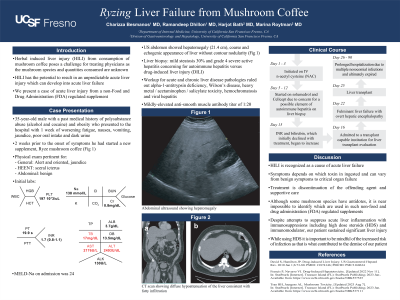Tuesday Poster Session
Category: Liver
P4862 - Ryzing Liver Failure From Mushroom Coffee
Tuesday, October 29, 2024
10:30 AM - 4:00 PM ET
Location: Exhibit Hall E

Has Audio
- CB
Charizza Grace Besmanos, MD
University of California San Francisco
Fresno, CA
Presenting Author(s)
Charizza Grace Besmanos, MD1, Ramandeep Dhillon, MD1, Harjot Bath, MD1, Marina Roytman, MD2
1University of California San Francisco, Fresno, CA; 2UCSF Fresno, Fresno, CA
Introduction: Herbal-induced liver injury (HILI) from consumption of mushroom coffee poses a challenge as the mushroom species and quantities consumed are unknown. HILI has the potential to result in an unpredictable acute liver injury which can develop into acute liver failure.
Case Description/Methods: 35-year-old male with history of substance use (alcohol, cocaine) and obesity presented to the hospital with one week of worsening fatigue, nausea, vomiting, jaundice, and dark urine. Two weeks prior, he started a new supplement, mushroom coffee. Initial workup revealed alanine aminotransferase (ALT) and aspartate aminotransferase (AST) > 2000 U/L, total bilirubin of 16.6 mg/dL, and International Normalized Ratio (INR) of 5 concerning for acute liver injury. Model for End-Stage Liver Disease-Sodium (MELD-Na) on admission was 24. Liver ultrasound showed hepatomegaly, coarse liver without contour nodularity. He underwent liver biopsy showing 30% steatosis and severe active hepatitis concerning for autoimmune hepatitis or drug-induced liver injury. Workup for acute and chronic liver disease ruled out alpha-1-antitrypsin deficiency, Wilson’s disease, heavy metal/acetaminophen toxicity, hemochromatosis and viral hepatitis. He had mildly elevated anti-smooth muscle antibody titer of 1:20. Intravenous n-acetyl cysteine was started during workup. His symptoms improved with initiation of methylprednisolone and mycophenolate, which were started due to concern for a possible element of autoimmune hepatitis on liver biopsy. His INR and bilirubin, which initially declined with treatment, began to increase. He was subsequently admitted to a transplant capable institution for liver transplant evaluation. He progressed to fulminant liver failure with overt hepatic encephalopathy. He underwent liver transplant, followed by prolonged hospitalization due to nosocomial infections and ultimately expired.
Discussion: HILI is recognized as a cause of acute liver failure. Treatment is discontinuation of the offending agent. Clinical manifestations of mushroom poisoning can vary from benign symptoms to critical organ failure. Though some mushroom species have antidotes, it is near impossible to identify those used in non-Food and Drug Administration (FDA) regulated supplements. Despite attempts to suppress acute liver inflammation with high dose steroids (HDS), our patient sustained significant liver injury. When using HDS it is important to be mindful of the increased risk of infection which contributed to the demise of our patient.
Disclosures:
Charizza Grace Besmanos, MD1, Ramandeep Dhillon, MD1, Harjot Bath, MD1, Marina Roytman, MD2. P4862 - Ryzing Liver Failure From Mushroom Coffee, ACG 2024 Annual Scientific Meeting Abstracts. Philadelphia, PA: American College of Gastroenterology.
1University of California San Francisco, Fresno, CA; 2UCSF Fresno, Fresno, CA
Introduction: Herbal-induced liver injury (HILI) from consumption of mushroom coffee poses a challenge as the mushroom species and quantities consumed are unknown. HILI has the potential to result in an unpredictable acute liver injury which can develop into acute liver failure.
Case Description/Methods: 35-year-old male with history of substance use (alcohol, cocaine) and obesity presented to the hospital with one week of worsening fatigue, nausea, vomiting, jaundice, and dark urine. Two weeks prior, he started a new supplement, mushroom coffee. Initial workup revealed alanine aminotransferase (ALT) and aspartate aminotransferase (AST) > 2000 U/L, total bilirubin of 16.6 mg/dL, and International Normalized Ratio (INR) of 5 concerning for acute liver injury. Model for End-Stage Liver Disease-Sodium (MELD-Na) on admission was 24. Liver ultrasound showed hepatomegaly, coarse liver without contour nodularity. He underwent liver biopsy showing 30% steatosis and severe active hepatitis concerning for autoimmune hepatitis or drug-induced liver injury. Workup for acute and chronic liver disease ruled out alpha-1-antitrypsin deficiency, Wilson’s disease, heavy metal/acetaminophen toxicity, hemochromatosis and viral hepatitis. He had mildly elevated anti-smooth muscle antibody titer of 1:20. Intravenous n-acetyl cysteine was started during workup. His symptoms improved with initiation of methylprednisolone and mycophenolate, which were started due to concern for a possible element of autoimmune hepatitis on liver biopsy. His INR and bilirubin, which initially declined with treatment, began to increase. He was subsequently admitted to a transplant capable institution for liver transplant evaluation. He progressed to fulminant liver failure with overt hepatic encephalopathy. He underwent liver transplant, followed by prolonged hospitalization due to nosocomial infections and ultimately expired.
Discussion: HILI is recognized as a cause of acute liver failure. Treatment is discontinuation of the offending agent. Clinical manifestations of mushroom poisoning can vary from benign symptoms to critical organ failure. Though some mushroom species have antidotes, it is near impossible to identify those used in non-Food and Drug Administration (FDA) regulated supplements. Despite attempts to suppress acute liver inflammation with high dose steroids (HDS), our patient sustained significant liver injury. When using HDS it is important to be mindful of the increased risk of infection which contributed to the demise of our patient.
Disclosures:
Charizza Grace Besmanos indicated no relevant financial relationships.
Ramandeep Dhillon indicated no relevant financial relationships.
Harjot Bath indicated no relevant financial relationships.
Marina Roytman: Gilead – Speakers Bureau. Madrigal – Speakers Bureau. Salix – Speakers Bureau.
Charizza Grace Besmanos, MD1, Ramandeep Dhillon, MD1, Harjot Bath, MD1, Marina Roytman, MD2. P4862 - Ryzing Liver Failure From Mushroom Coffee, ACG 2024 Annual Scientific Meeting Abstracts. Philadelphia, PA: American College of Gastroenterology.
